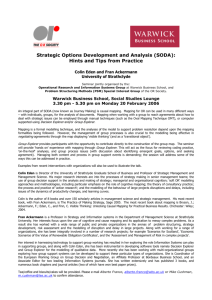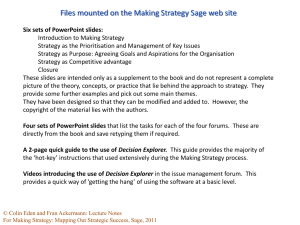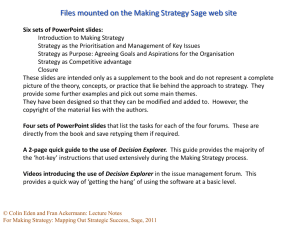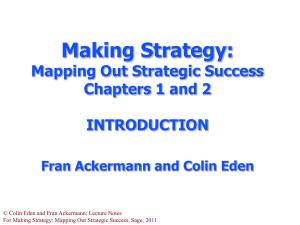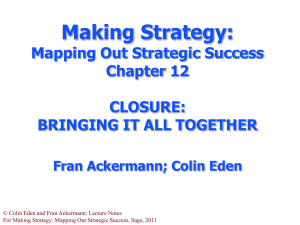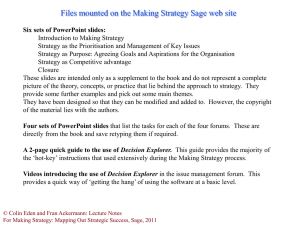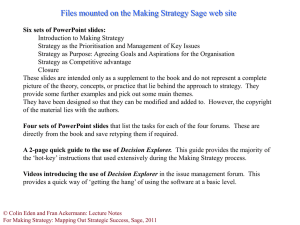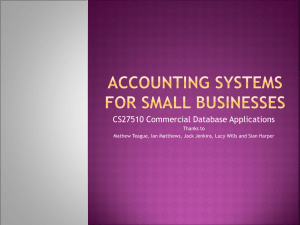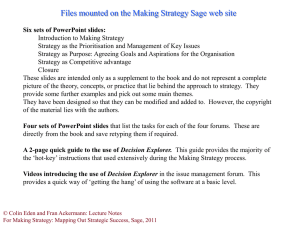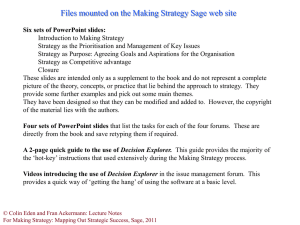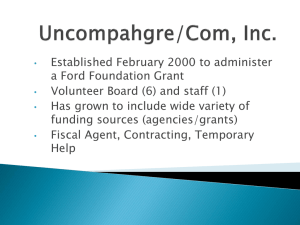Assignment Details - Sage Publications
advertisement
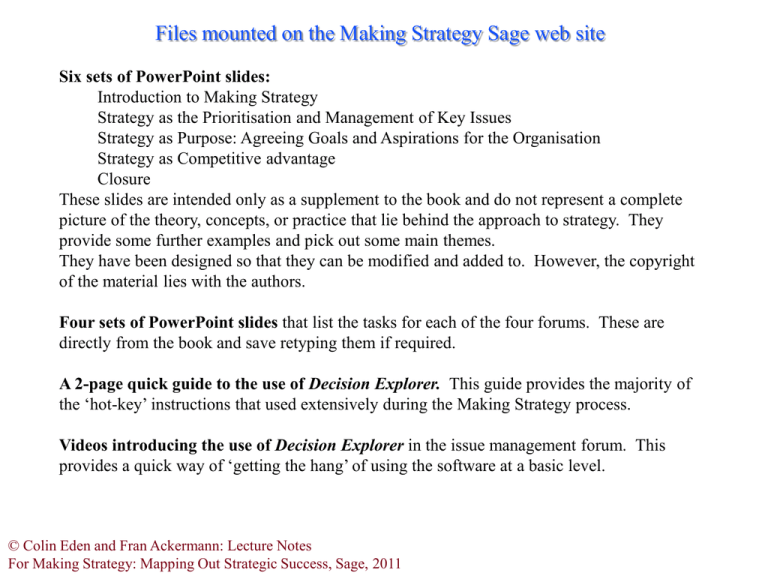
Files mounted on the Making Strategy Sage web site Six sets of PowerPoint slides: Introduction to Making Strategy Strategy as the Prioritisation and Management of Key Issues Strategy as Purpose: Agreeing Goals and Aspirations for the Organisation Strategy as Competitive advantage Closure These slides are intended only as a supplement to the book and do not represent a complete picture of the theory, concepts, or practice that lie behind the approach to strategy. They provide some further examples and pick out some main themes. They have been designed so that they can be modified and added to. However, the copyright of the material lies with the authors. Four sets of PowerPoint slides that list the tasks for each of the four forums. These are directly from the book and save retyping them if required. A 2-page quick guide to the use of Decision Explorer. This guide provides the majority of the ‘hot-key’ instructions that used extensively during the Making Strategy process. Videos introducing the use of Decision Explorer in the issue management forum. This provides a quick way of ‘getting the hang’ of using the software at a basic level. © Colin Eden and Fran Ackermann: Lecture Notes For Making Strategy: Mapping Out Strategic Success, Sage, 2011 Group Explorer There is also available a Group Support System that allows participants to enter statements and links directly in to a publicly displayed Decision Explorer model. The system also allows for the rating of statements, and the indication of preferences about, for example, options to focus on, undesirable options, leverage on goals, etc. The significant benefits of the system are higher productivity, anonymity when appropriate, the ability to monitor development consensus, and facilitator monitoring of levels of participation and type of participation. The system has been used extensively over the past 10 years by a number of Business Schools, managers, and consultants. It has been used with top management teams of MNC’s as well as with pressure groups. The system requires the purchase of the Group Explorer software from Ackermann&Eden at Strathclyde Business School, a full copy of Decision Explorer, Windows Server, and 2 laptop computers (one running Windows Server and the other Windows 7). See: Ackermann, F. and Eden, C. Negotiation in Strategy Making Teams Group Support Systems and the Process of Cognitive Change. Group Decision and Negotiation. 2011; 20(3)293-314. Andersen, D.; Richardson, G. P.; Ackermann, F., and Eden, C. Using a Group Support System to Add Value to Group Model Building. System Dynamics Review. 2010; 26(4)335-346. © Colin Eden and Fran Ackermann: Lecture Notes For Making Strategy: Mapping Out Strategic Success, Sage, 2011 Making Strategy Assignment Details © Colin Eden and Fran Ackermann: Lecture Notes For Making Strategy: Mapping Out Strategic Success, Sage, 2011 Please note, these slides are designed to be used in addition to the book: Making Strategy: Mapping Out Strategic Success. by Ackermann & Eden, Sage, 2011 They are not designed to be used in a ‘stand-alone’ manner, or to replicate theory and practice presented in the book. The assignment design represents one possibility for a 20 credit MBA course (thus each of the 4 parts represents approx 5 credits + Closure). © Colin Eden and Fran Ackermann: Lecture Notes For Making Strategy: Mapping Out Strategic Success, Sage, 2011 Notes: Making Strategy Please note it is NOT possible to achieve good marks without having worked through the ‘essential’ introductory videos noted on the Making Strategy intranet site Attendance at all sessions is strongly advised, and attendance at the Intensive seminar is compulsory unless the assignment is to be undertaken by following distance learning procedures © Colin Eden and Fran Ackermann: Lecture Notes For Making Strategy: Mapping Out Strategic Success, Sage, 2011 Process Requirements (1): You MUST: Form a group from your MBA cohort of a minimum 3 persons (max 5 persons), and agree to tackle the Strategy of the department/ division/ organisation of one of your group members If you do not attend the seminars then you are required to undertake the assignment in a different manner – see last slide of this pack You will work through a number of strategy making tasks that are related to chapters in “Making Strategy: Mapping Out Strategic Success” (MOSS). © Colin Eden and Fran Ackermann: Lecture Notes For Making Strategy: Mapping Out Strategic Success, Sage, 2011 Process Requirements (2): Your own copy of the assignment can, if you wish, be different in some respects from the submission from your group colleagues, but the strategy content build-up must be the same (you may wish to add your own inserted commentary on your separate submission). However, bear in mind that you may finish up with lower marks than the rest of your group, as well as possibly higher marks! © Colin Eden and Fran Ackermann: Lecture Notes For Making Strategy: Mapping Out Strategic Success, Sage, 2011 Process Requirements (3): You are required to use ‘Decision Explorer’ (DE) for conducting all of the tasks (except writing the Statement of Strategic Intent, and your own reflections). The DE software can be downloaded from the Intranet and installed on your own PC. A Quick Start Guide and tutorials are available as well as a very brief as well as short user guide (the full user guide is available on the www.banxia.com) Bring a copy of the brief guide along to all classes Note: the Videos also provide an introduction to using Decision Explorer for Making Strategy. © Colin Eden and Fran Ackermann: Lecture Notes For Making Strategy: Mapping Out Strategic Success, Sage, 2011 Making Strategy in 4x~3hr workshops (2 days)…. Or single half day workshops Workshop 1 – morning • Strategy as the Prioritisation and Management of Key Issues • Statement of Strategic Intent Workshop 2 – afternoon • Strategy as Purpose: Agreeing Goals and Aspirations for the Organisation • Statement of Strategic Intent Workshop 3 – morning • Strategy as Competitive advantage • Statement of Strategic Intent Workshop 4 – afternoon • Strategy as Stakeholder Management • Statement of Strategic Intent DELIVERABLE OVERALL: • Statement of strategic intent (SSI) encompassing: issue management, purpose, competitive advantage, stakeholder management © Colin Eden and Fran Ackermann: Lecture Notes For Making Strategy: Mapping Out Strategic Success, Sage, 2011 The assignment: notes (1 of 3) Submit on one page A4 for each of 11 tasks (plus 1 extra map for each of task 4 and 7), thus 13 pages of A4 in total Each of tasks 1, 4, and 7 are to be submitted as Decision Explorer maps 1. Strategy as Issue Management Issue map as tidied hierarchical map, with priorities marked (Chapter 3 and 4 of MOSS) Ensure that the statements are action oriented Direction of causality follows cause mapping guidelines/formalisms It is expected that the map will include at least 25 issues however, remember in “real” workshops it is likely you have over 50 Ensure that you go beyond the initial surfacing of negative situations and include some strategic opportunities 2. Reflective Commentary focusing predominantly on negotiation process – include examples (max 300 words) 3. SSI from Issue Management CONTINUED…. © Colin Eden and Fran Ackermann: Lecture Notes For Making Strategy: Mapping Out Strategic Success, Sage, 2011 The assignment: notes (2 of 3) 4. Strategy as Purpose Emergent Goals system – 1st draft (Chapter 5 and 6 of MOSS) Ensure that goals meet the definition provided in Chapter of PMS The map has around 10-15 goals That the system considers ‘negative goals’ when appropriate Ensure you have conducted the final review of the goal system 2 pages are required: one page shows laddering upwards from at least one 3* priority, and the other page shows the final goal system after imposing ‘published goals’ (showing goals only) 5. Reflective Commentary focusing predominantly on negotiation process – include examples (max 300 words) 6. SSI from Purpose CONTINUED…. © Colin Eden and Fran Ackermann: Lecture Notes For Making Strategy: Mapping Out Strategic Success, Sage, 2011 The assignment: notes (3 of 3) 7. Strategy as Competitive Advantage (Chapter 7 and 8 of MOSS) Map of competencies with DC’s marked, and DC patterns shown on separate maps – thus, 2 pages are required: Ensure that all of the distinctive competencies are plausibly distinctive! Show which are Das, DCs, or DCOs Show basis for DC pattern 8. Reflective Commentary focusing predominantly on negotiation process – include examples (max 300 words) 9. SSI from Competitive Advantage 10. Combine 1-3, 4-6, and 7-9 to produce an aggregate SSI (Chapter 12 of MOSS) 11. Commentary on issues arising from combining: eg conflicts, analysis, aggregation, etc SUBMIT 13 PAGES IN TOTAL (5 MAPS + 8 PAGES OF TEXT) + PEER ASSESSEMENT FORM © Colin Eden and Fran Ackermann: Lecture Notes For Making Strategy: Mapping Out Strategic Success, Sage, 2011 The Assignment Submission 1 peer assessment form (available on the intranet) MUST be submitted per student and submitted under separate cover and each form must be signed by the person submitting it. Failure to submit a peer assessment form will result in your assignment not being marked and so given a mark of zero. Only the required 13 pages required will be marked, any additional pages will be discarded. © Colin Eden and Fran Ackermann: Lecture Notes For Making Strategy: Mapping Out Strategic Success, Sage, 2011 Undertaking Making Strategy without attending the seminars If you are unable to attend the seminars (including local counselling sessions where appropriate) then you are required to undertake the assignment as follows: • Form a strategy making group with at least 3 people. • Develop a strategy using the Making Strategy book, Decision Explorer and slides on the intranet • The strategy may be, for example, for a community centre, club, or for your own organisation (if the group members are your colleagues) • The assignment submission follows the guidelines included above. © Colin Eden and Fran Ackermann: Lecture Notes For Making Strategy: Mapping Out Strategic Success, Sage, 2011
